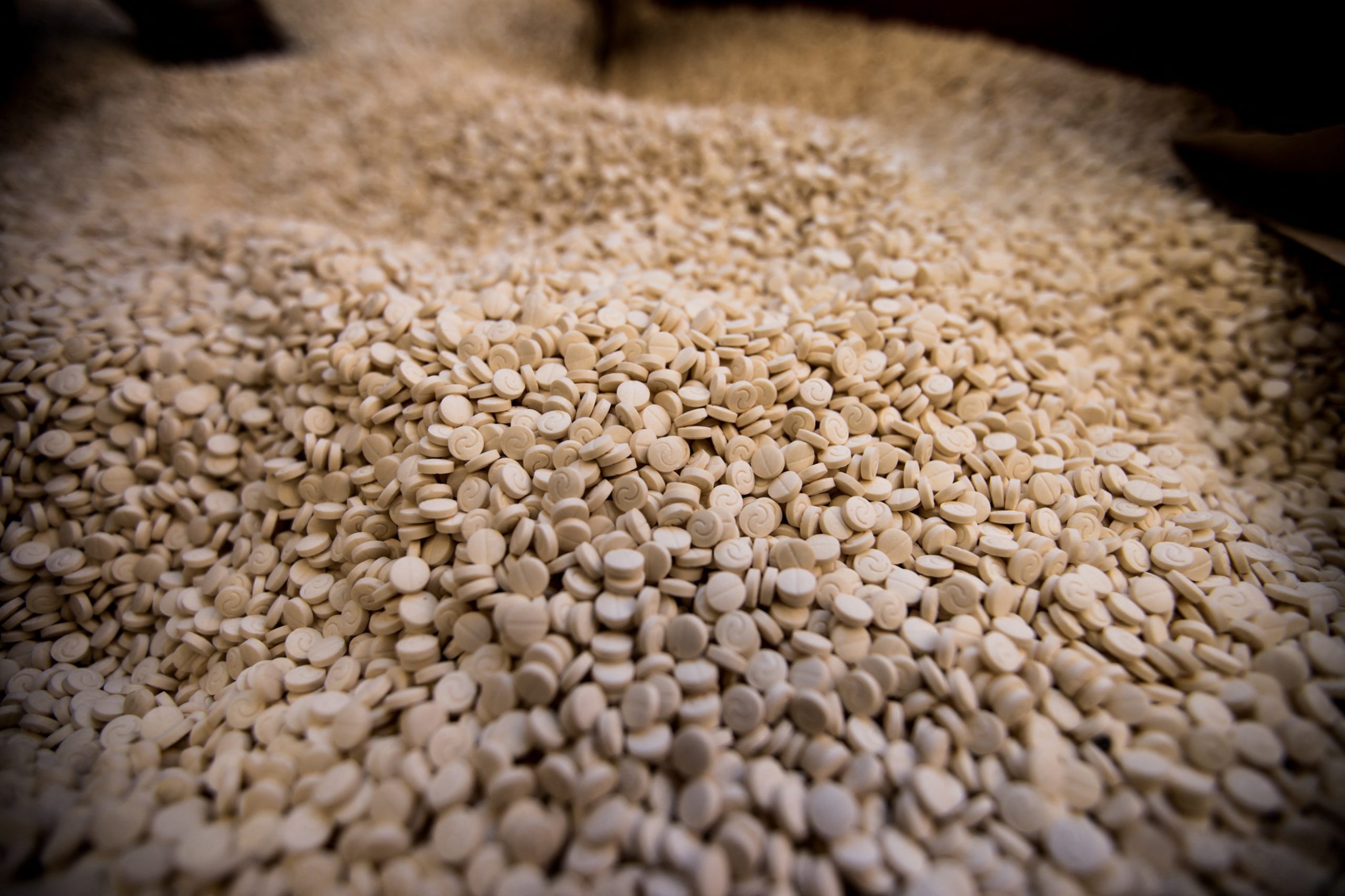Publications
INSS Insight No. 1879, July 21, 2024
After restoring his status in the Arab world and emerging from the political isolation imposed on Syria with the outbreak of the civil war, Bashar al-Assad continues to benefit from the revenues of the Captagon drug trade, which is produced in Syria and floods the Middle East. The Captagon trade poses risks to Israel, as it is a significant source of funding for the regime, Hezbollah, and other Shiite proxy organizations, as well as by using drug smuggling routes to transfer weapons from Jordan to the West Bank and Gaza Strip. Western and regional countries are joining forces to combat the phenomenon to reduce the dangers this drug trade poses to regional stability, and this joint struggle may provide Israel with an opportunity to demonstrate its value and strengthen its ties with countries in the region.
Since 2023, the Assad regime has enjoyed diplomatic achievements, primarily the reinstatement of Syria into the Arab League and the renewal of relations with Saudi Arabia—developments that marked the end of the isolation and boycott imposed on Syria by the Arab world with the outbreak of the civil war in 2011. At the same time, the regime and its affiliates, including units in the Syrian army, continue to oversee and expand the production and trade of the drug Captagon, which they have extended to other types of drugs as well as weapons. Today, Syria is the world’s largest exporter of Captagon, with Jordan and Saudi Arabia being the main targets.
Jordan was one of the key players in the regional normalization process with Assad, hoping that recognizing him would, in part, enlist him in the fight against Captagon. However, disappointment with the increasing volumes of Captagon smuggled into its territory led Jordan to adopt a more aggressive policy toward Syria. In June, Jordanian authorities reported several instances in which they had thwarted smuggling attempts and eliminated smugglers on the border between the two countries. At the beginning of June, it was reported that Jordan had foiled the largest drug smuggling attempt in recent years from Syria, which included 9.5 million Captagon pills destined for Saudi Arabia, as well as having intercepted drones carrying the drug from Syria into Jordanian airspace.
In May 2023, the Jordanian military decided to take a step further and launched air attacks against Syrian targets linked to the drug production and smuggling networks. The first strike, which took place a day after Syria’s readmission to the Arab League, resulted in the elimination of Marai al-Ramthan, dubbed the “Syrian Escobar.” In early 2024, Jordan significantly increased the frequency of airstrikes in southern Syria, and to date, it has been reported that Jordan has attacked the country at least four times, exceeding the total number of Jordanian strikes reported in 2023. At the same time, the kingdom is working to strengthen its border with Syria by increasing the presence of military forces and employing technological means to detect smugglers and intercept drones. Publicly, during the last Arab League summit held in Manama, Bahrain in May 2024, the king of Jordan addressed the issue of drug and arms smuggling into his country, emphasized the involvement of pro-Iranian militias in the drug industry, and called on regional countries to join the fight.
On May 26, a year after the renewal of relations between Saudi Arabia and Syria, a permanent Saudi ambassador was appointed in Damascus. Like Jordan, Saudi Arabia had hoped that normalization with the Assad regime would reduce the Captagon trade. However, these hopes were not realized. For example, 48 hours after the Saudi ambassador’s appointment, Saudi authorities intercepted a shipment of Captagon worth about $75 million and an additional $40 million worth of Captagon in Iraq. Throughout 2023, according to reports, Saudi authorities seized millions of Captagon pills, despite the increase in the frequency of bilateral meetings between representatives of the two countries.
Indeed, the Syrian regime appears to be taking steps that indicate cooperation in the fight against Captagon smuggling. The Syrian media consistently covers raids conducted by the Syrian Interior Ministry against smuggling attempts, and Syria has convened working groups with Jordan and Iraq on the subject, agreeing to tighten cooperation with them to prevent drug smuggling through border crossings. However, these measures are merely a facade and do not represent a genuine effort to combat the phenomenon; an extensive investigation by the opposition Syrian television network Syria TV revealed the regime’s extensive drug network and its associates, including the names of key drug dealers and the division of production sectors in the country. The investigation also covered methods the regime uses to deceive regional countries and the international community, including false reports to the UN Office on Drugs and Crime (UNODC) about thwarting attempts and arresting those involved in the industry. It was also reported that the official Syrian news agency, SANA, repeats the same report several times a month, claiming the interception of drug shipments on their way to the Jordanian border and using the same images, to create the appearance of an effective fight against the phenomenon by the regime.

Western countries, led by the United States, have recently joined the fight against Captagon. In June 2023, the American administration announced the strategic plan to be implemented under the Captagon Act, which was passed in Congress at the end of 2022. According to the plan, the United States will assist law enforcement agencies in combating the distribution of Captagon and will continue to impose sanctions and additional economic pressures on Assad and his associates involved in the trade. Additionally, Washington will help its partners in the Middle East fight drug trafficking in the areas of border security, intelligence information, internal security, and law enforcement. Even before the plan was approved, the United States, the United Kingdom, and the European Union imposed sanctions on key figures involved in drug production and trade in Syria and Lebanon. These included the president’s cousins, Wassim-Badi and Samer Kamal al-Assad, as well as businessmen and militia commanders close to the regime and Hezbollah. This was one of the most significant steps Western countries have taken against Captagon smuggling so far. In April 2024, the Captagon Act was expanded and, for the first time, approved by the Senate and signed by the president. The legislation updated the list of sanctions imposed on individuals and companies involved in the drug industry. Other European countries are also part of the fight, including Germany, which announced in June 2024 its intention to assist in combating the issue through interdiction and campaigns to increase awareness of the dangers of drug consumption.
The Impact of Captagon on Israel
The phenomenon of Captagon in Israel is not widespread, although there have been past reports of attempts to smuggle Captagon into the country. As early as 2015, there were indications that Captagon began gaining popularity, especially among Palestinians from the West Bank and East Jerusalem. It was noted then that the drug was mainly used by workers who needed to stay alert for long periods. Over the years, the distribution of the drug has expanded primarily in the West Bank and Gaza Strip. For example, in December 2023, an attempt to smuggle Captagon from Jordan to the West Bank was foiled. In addition to the drugs, Jordanian security forces also seized a shipment of anti-tank rocket launchers, grenade launchers, Iranian-made Fajr rockets, sniper rifles and explosives with Iranian labels, mines, rifles, and a car filled with explosives. Thus, drug smuggling routes and infrastructure are also used for arms smuggling, turning a criminal issue into a security threat.
After the October 7 attack, it was claimed that some Hamas operatives who infiltrated the western Negev were found to have used the drug. This information has not been confirmed by any official source in Israel, and even if the drug had been used, it is more likely that it was sporadic use by a few terrorists and not part of Hamas’s operational plan. Moreover, psychiatrists studying stimulants similar to those in Captagon argue that attributing the actions of those terrorists to drugs is a false comfort, as these substances are not fundamentally different from prescription drugs and party drugs commonly consumed. In recent years, it has been claimed that the main consumers of Captagon in the Gaza Strip were workers involved in digging underground tunnels, who needed to work long hours.
Implications
Regional countries had expected Assad to prefer to give up his involvement in the distribution of Captagon or at least work to reduce it in exchange for normalization with the Arab world. However, today he enjoys the best of both worlds: The president maintains his economic lifeline and stability thanks to drug profits, while Syria’s diplomatic relations with its Arab neighbors are not in any jeopardy. This is because Jordan, Iraq, and Gulf states recognize that Assad is not a genuine partner in the fight against drug distribution, but in the absence of a better alternative, they acknowledge him and expand their diplomatic and economic ties with him, albeit in a limited manner.
As for Israel, the Captagon industry of the Syrian regime and Hezbollah elements poses risks. The economic profits from drug exports contribute to the military build-up of the Syrian army, Hezbollah, and other Shiite militias. Captagon smuggling routes are often used for smuggling weapons to Gaza and the West Bank through Jordan, and recently, there have been increasing reports of Iranian involvement in operating smugglers as part of a broader plan to turn Jordan into another arena through which Iran can act against Israel.
Nonetheless, the Captagon phenomenon could provide an opportunity for Israel to strengthen its ties with regional countries concerned about the spread of the drug within their borders through technological, intelligence, and diplomatic assistance in the fight. Israel’s value in this context could be particularly evident with Jordan, whose relations have deteriorated due to the war in Gaza. Therefore, it is appropriate for the defense establishment to allocate more resources in terms of intelligence coverage and technological solutions than currently invested in combating the drug’s spread. Such cooperation would enhance Israel’s image as a positive force striving for regional stability and could lay the foundations for a broader fight against Iran and other elements in the resistance axis benefiting from drug profits.



